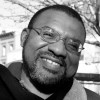Visiting Writer Spotlight
“Every Part of Who I Am”: An Interview with Kwame Dawes:

The Pleiades Visiting Writers Series for Spring 2015 kicked off on January 28th with a lecture and reading by writer, activist, teacher, editor, critic and director Kwame Dawes. Dawes was born in Ghana in 1962 and was raised in Jamaica. He lived for many years in South Carolina, and now works at the University of Nebraska-Lincoln as a Professor of English and editor-in-chief of Prairie Schooner.
To welcome Dr. Dawes to the University of Central Missouri, UCM students and faculty gathered in the Gallery of Art and Design for a public lecture and reading by Kwame Dawes. Those in attendance received a rare peek into the writing process of Dawes. He took the time to explain where each poem came from and how much of his personal history he put into every piece of writing.
In a brief interview following the reading, Kwame Dawes discussed more about his writing.He started the hour with a reading of the poem “How to pick a Hanging Tree.” This devastating work was prefaced by a moment of levity in which Dawes described his trip as a tourist to a Southern plantation home, providing a fascinating contrast of tone and subject. When the audience was given the opportunity to ask Kwame Dawes a few questions, he was asked about his opinion of poetry’s role in society and his answer was “Poetry is primarily the use of language. I don’t think poets are particularly insightful, the difference is the capacity to use language.” When asked about his writing process, Dawes replied “I write quickly.” He explained how he will always do the first draft in one sitting, to figure out what the poem will be about. After he has completed the first draft and has an idea what the poem will be, he spends as much time as it takes to hone it into what it becomes. “Every part of who I am comes out in my poems.”
AR: How do you consider your work to be in conversation with literary tradition? Which literary tradition do you consider your poetry to be in conversation with?
KD: I would say first and foremost it is in conversation with the African diasporic tradition, particularly in the works of poet from the Caribbean, the African American poets, people like Langston Hughes and Paul Laurence Dunbar. But its also part of a the western tradition of poetry, which was very influential in my own development as a child growing up and the work of poets from Europe, from the UK and so on. But in a sense, I really believe that I am part of the Caribbean tradition of forging a new poetics for the world and in that way we are doing it through being in dialogue with the poets who have come before, but also, sort of, in dialogue with the poets that are coming after. And then I think its exciting to feel what we call African Poetry is so eclectic and so wide-ranging and I can feel as comfortable as an African Poet as anybody else will. So there’s that, but there’s a purer sense, though. I should say I am in a more general sense in which as a poet I travel around to many festivals and I realize that we are in dialogue across languages and across cultures because we are endeavoring to do something with language and that shared experience, I think is something that remains very exciting. And I believe that’s the part of the conversation that has affected my work.
AR: You say you now feel comfortable as an African Poet, was there ever a time you did not feel comfortable or felt out of place?
KD: No, I don’t think that was the issue but I think that the challenges with African Poetry and the reason that we started the African Poetry Book Fund was theres so little centralized place where you can say okay this is where the African poets are and theres not much of it being published. So, now that I am in conversation with all these poets and we are talking about poetry and publishing and so on, it’s a conversation that I think there is something to be a part of. Whereas before, I don’t think there was that space created.
AR: What is next for the African Poetry Book Fund?
KD: We just completed a box set, this one is 8th new generation. I’ve seen it, it is beautiful. And then we’ve also set up these poetry libraries in five different countries in Africa. And some of them have been launched already. The last one to be launched will be launched in the next couple of months in Kenya. We ship books every year, about 500 books to each of these places for their poetry libraries. And then we are also publishing individual volumes of poems by our Sillerman Prize winner. This year’s Sillerman Prize winner is an Ethiopian born poet who lives in California. So her book is going to come out next year. This year Ladan Osman’s book The Kitchen Dwellers’ Testimony will come out. And then we are publishing a number of poets who just sent us work. So we are publishing but we are also doing development work with libraries in Africa.
